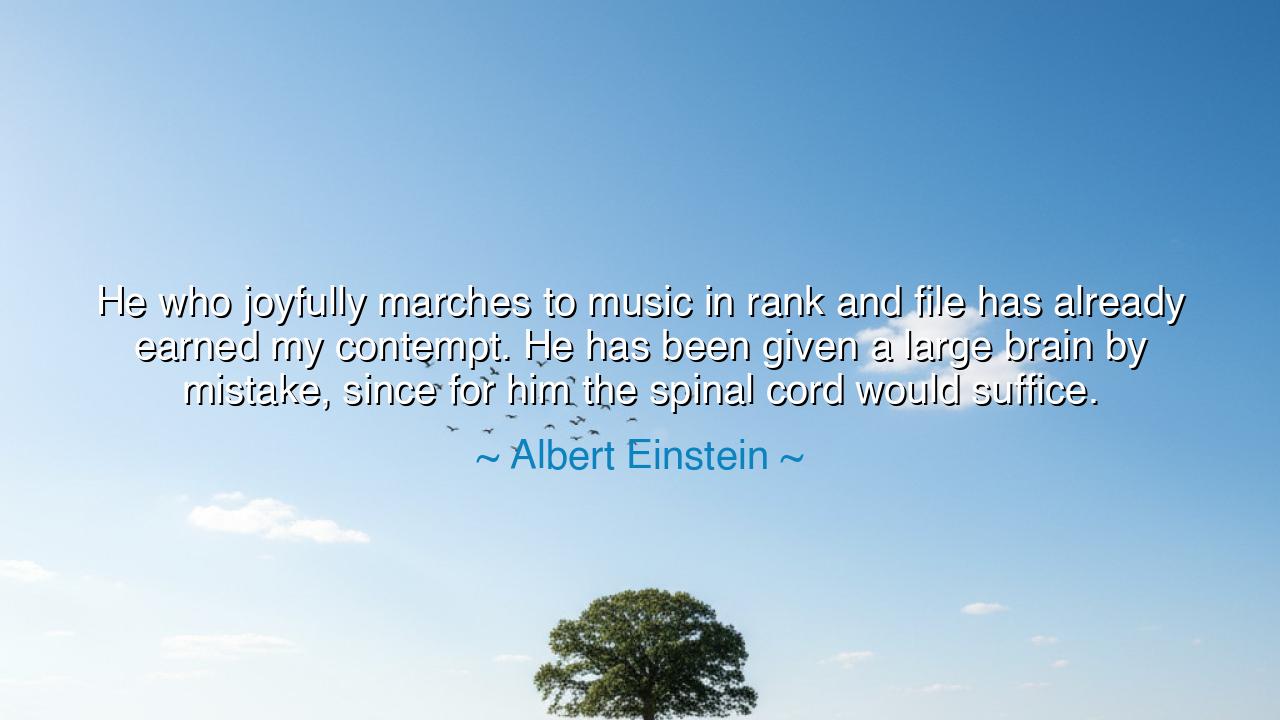
He who joyfully marches to music in rank and file has already
He who joyfully marches to music in rank and file has already earned my contempt. He has been given a large brain by mistake, since for him the spinal cord would suffice.






“He who joyfully marches to music in rank and file has already earned my contempt. He has been given a large brain by mistake, since for him the spinal cord would suffice.” Thus spoke Albert Einstein, a man of science who also understood the spiritual weight of freedom. Beneath these sharp and defiant words lies a truth that burns through the ages — a warning against blind obedience, against the death of thought, against the quiet surrender of the human soul to the machinery of conformity. For Einstein, intellect was not a tool to serve authority, but a flame to illuminate the path of conscience. When that flame is extinguished, even the greatest mind becomes hollow, and the man who could have reasoned becomes little more than a creature of reflex.
In these words, Einstein raises his voice against the mindless obedience that drives men to march in step without asking where they go. The rank and file — the soldiers who follow without question, the citizens who bow to false order, the thinkers who silence their own doubt — these are not the truly alive. To march joyfully under command, he says, is to abandon the gift of thought, that divine spark that separates humanity from the beasts. The one who does so might as well be ruled by instinct alone, his spinal cord guiding him like a puppet pulled by invisible strings.
Einstein had witnessed the rise of militarism and nationalism in Europe. He had seen how great nations turned their youth into instruments of war, how science was twisted into weaponry, how men with hearts once pure became servants of ideology. During the First World War, when millions marched to their deaths to the rhythm of patriotic drums, Einstein stood apart. He refused to cheer for conquest or vengeance. He saw the madness of obedience, and it filled him with sorrow and disdain. To him, the tragedy was not only in the slaughter of bodies, but in the death of reason — in the millions who no longer thought, but merely obeyed.
Look to history, and you will see how this truth repeats itself like a shadow. In Nazi Germany, the land of poets and philosophers became the stage for unspeakable horror. Ordinary men, not born evil, became executioners because they were told it was their duty. They marched to music in rank and file, proud in uniform, blind in purpose. The intellect that might have questioned was silenced by fear or pride. The conscience that might have resisted was buried under orders. Thus, the spinal cord ruled where the mind should have stood — and civilization itself trembled beneath the weight of obedience.
Yet even in such darkness, there have been those who stood apart — souls who refused to march. Think of Sophie Scholl, the young German student who, during the Second World War, defied the regime through words and courage. She and her brother spread leaflets calling for truth and moral awakening. When captured, she faced her death with dignity, saying, “What does my death matter if through us thousands are awakened and stirred to action?” In her, the spirit of Einstein’s words shone bright — a mind that refused to bow, a conscience that refused to be silenced.
To the youth who read these words, take heed: the world will always try to make you march. It will call you to conform, to obey without question, to blend into the rhythm of the crowd. It will tell you that safety lies in silence, and that peace lies in obedience. But know this — obedience without thought is the death of the soul. The brain was given to you not to echo others, but to seek truth; not to serve blind power, but to discern justice. The greatest act of courage is not to follow, but to stand alone when conscience demands it.
So, let this be your lesson, passed down as an eternal flame: Think for yourself. Question every order that defies compassion. March only to the music that your heart and reason approve. If you must stand against the crowd to remain true to your conscience, then stand tall, for such is the burden and the glory of being human. Remember Einstein’s warning — to think is divine, but to obey without thought is to descend into darkness. Let your mind be your compass, and your conscience be your guide, and you shall walk not in rank and file, but in freedom.






AAdministratorAdministrator
Welcome, honored guests. Please leave a comment, we will respond soon